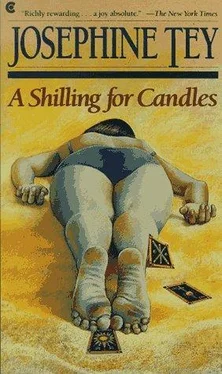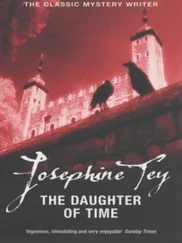Josephine Tey - A Shilling for Candles
Здесь есть возможность читать онлайн «Josephine Tey - A Shilling for Candles» весь текст электронной книги совершенно бесплатно (целиком полную версию без сокращений). В некоторых случаях можно слушать аудио, скачать через торрент в формате fb2 и присутствует краткое содержание. Год выпуска: 1936, Жанр: Классический детектив, на английском языке. Описание произведения, (предисловие) а так же отзывы посетителей доступны на портале библиотеки ЛибКат.
- Название:A Shilling for Candles
- Автор:
- Жанр:
- Год:1936
- ISBN:нет данных
- Рейтинг книги:4 / 5. Голосов: 1
-
Избранное:Добавить в избранное
- Отзывы:
-
Ваша оценка:
- 80
- 1
- 2
- 3
- 4
- 5
A Shilling for Candles: краткое содержание, описание и аннотация
Предлагаем к чтению аннотацию, описание, краткое содержание или предисловие (зависит от того, что написал сам автор книги «A Shilling for Candles»). Если вы не нашли необходимую информацию о книге — напишите в комментариях, мы постараемся отыскать её.
A Shilling for Candles — читать онлайн бесплатно полную книгу (весь текст) целиком
Ниже представлен текст книги, разбитый по страницам. Система сохранения места последней прочитанной страницы, позволяет с удобством читать онлайн бесплатно книгу «A Shilling for Candles», без необходимости каждый раз заново искать на чём Вы остановились. Поставьте закладку, и сможете в любой момент перейти на страницу, на которой закончили чтение.
Интервал:
Закладка:
By eleven that Friday evening Grant was faced with the fact that they were just where they were a week previously, when he had canceled a theater seat and come down to Westover. Worse still, they had hounded a man into flight and hiding, and they had wasted seven days on a dud investigation while the man they wanted made his escape.
Grant's mind was a welter of broken ends and unrelated facts.
Harmer. He came into the picture now, didn't he? They had checked his story as far as it went. He really had made inquiries from the owner of the cherry orchard, and from the post office at Liddlestone at the times he said. But after that, what? After that no one knew anything about his movements until he walked into the cottage at Medley, sometime after eight the next morning.
There was — incredibly! — Edward Champneis, who had brought back topazes for his wife, but who, for some reason, was unwilling that his movements on that Wednesday night should be investigated. There could be no other reason for his desire to make Grant believe that he had arrived in England on Thursday morning. He had not come to England secretly. If you want to arrive secretly in a country, arriving in a populous harbor by yacht is not the way to do it. Harbor master and customs' officials are a constitutionally inquisitive race. Therefore it was not the fact of his arrival that he wanted to hide, but the way in which he had occupied his time since. The more Grant thought about it, the queerer it became. Champneis was at Dover on Wednesday night. At six on Thursday morning his well-loved wife had met her death. And Champneis did not want his movements investigated. Very queer!
There was, too, the "shilling for candles." That, which had first caught his interest and had been put aside in favor of more obvious lines of inquiry, that would have to be looked into.
On Saturday morning the newspapers, beginning to be bored with a four-day-old manhunt, carried the glad news that the hunted man was innocent. "New information having come to police." It was confidently expected that Tisdall would present himself before nightfall, and in that hope reporters and photographers lingered around the County police station in Westover; with more optimism than logic, it would seem, since Tisdall was just as likely to present himself at a station miles away.
But Tisdall presented himself nowhere.
This caused a slight stirring of surprise in Grant's busy mind when he had a moment to remember Tisdall; but that was not often. He wondered why Tisdall hadn't enough sense to come in out of the wet. It had rained again on Friday night and it had been blowing a northeaster and raining all Saturday. One would have thought he would have been glad to see a police station. He was not being sheltered by any of his old friends, that was certain. They had all been shadowed very efficiently during the four days that he was "wanted." Grant concluded that Tisdall had not yet seen a newspaper, and dismissed the thing from his mind.
He had set the official machinery moving to discover the whereabouts of Christine Clay's brother; he had started a train of inquiries which had the object of proving that Jason Harmer had once had a dark coat which he had lately discarded and which had a missing button. And he himself took on the investigation of Lord Edward Champneis. He noticed with his usual self-awareness that he had no intention of going to Champneis and asking for an account of his movements on Wednesday night. It would be highly embarrassing, for one thing, if Champneis proved that he had slept peacefully in his bunk all night. Or at the Lord Warden. Or otherwise had a perfect alibi. For another — oh, well, there was no getting away from the fact; one didn't demand information from the son of a ducal house as one demanded it from a coster. A rotten world, no doubt, but one must conform.
Grant learned that the Petronel had gone around to Cowes, where her owner, Giles Champneis, would live in her for Cowes's week. On Sunday morning, therefore, Grant flew down to Gosport, and got a boat across the glittering Spithead to the island. What had been a white flurry of rain-whipped water yesterday was now a Mediterranean sea of the most beguiling blue. The English summer was being true to form.
Grant flung the Sunday papers on the seat beside him and prepared to enjoy the crossing. And then his eye caught the Sunday Newsreel's heading: THE TRUTH ABOUT CLAY'S EARLY LIFE. And once more the case drew him into it. On the previous Sabbath, the Sunday Wire had had as its chief «middle» a tear-compelling article by that prince of newspapermen, Jammy Hopkins. The article had consisted of an interview with a Nottingham lace-hand, Miss Helen Cozens, who had, it appeared, been a contemporary of Christine Clay's in the factory. It had dealt touchingly with Chris's devotion to her family, her sunny disposition, her excellent work, the number of times Miss Helen Cozens had helped her in one way or another, and it had finished with a real Hopkins touch of get-togetherness. It had been the fate of one of these two friends, he pointed out, to climb to the stars, to give pleasure to millions, to irradiate the world. But there were other fates as glowing if less spectacular; and Helen Cozens, in her little two-room home, looking after a delicate mother, had had a destiny no less wonderful, no less worthy of the world's homage. It was a good article, and Jammy had been pleased with it.
Now the Sunday Newsreel appeared with an interview of its own. And it caused Grant the only smile he had enjoyed that week. Meg Hindler was the lady interviewed. Once a factory hand but now the mother of eight. And she wanted to know what the hell that goddamned old maid Nell Cozens thought she was talking about, and she hoped she might be struck down for her lies, and if her mother drank the lord knew it was no wonder with a nagging dyspeptic piece of acid like her daughter around, and everyone knew that Christina Gotobed was out of the factory and away from the town long before Nell Cozens put her crooked nose into the place at all.
It was not put just like that, but to anyone reading between the lines it was perfectly clear.
Meg really had known Christine. She was a quiet girl, she said, always trying to better herself. Not very popular with her contemporaries. Her father was dead and she lived with her mother and brother in a three-room tenement house. The brother was older, and was the mother's favorite. When Chris was seventeen the mother had died, and the family had disappeared from Nottingham. They did not belong to the town and had had no roots there, and no one had regretted them when they went. Least of all people who hadn't come into the town until years afterwards.
Grant wondered how Jammy would enjoy being taken for a ride by the imaginative Nell. So the elder brother had been the mother's favorite, had he? Grant wondered how much that meant. A shilling for candles. What family row had left such a mark that she should immortalize it in her will? Oh, well! Reporters thought they were clever, but the Yard had ways and means that were not open to the Press, however powerful. By the time he got back tonight, Christine Clay's early life would be on his desk in full detail. He discarded the Wire and turned to the other papers in the bundle. The Sunday Telegraph had a symposium — a very dignified and conveniently cheap method of filling a page. Everyone from the Archbishop of Canterbury to Jason Harmer had given their personal view of Christine Clay and her influence on her art. (The Sunday Telegraph liked influence and art. Even boxers never described punches to it: they explained their art.) The silly little paragraphs were all conventional, except Jason's, which had a violent sincerity beneath its sickly phrases. Marta Hallard was graceful about Clay's genius, and for once omitted to condone her lowly origin. The heir to a European throne extolled her beauty. A flying ace her courage. An ambassador her wit. It must have cost the Telegraph something in telephones.
Читать дальшеИнтервал:
Закладка:
Похожие книги на «A Shilling for Candles»
Представляем Вашему вниманию похожие книги на «A Shilling for Candles» списком для выбора. Мы отобрали схожую по названию и смыслу литературу в надежде предоставить читателям больше вариантов отыскать новые, интересные, ещё непрочитанные произведения.
Обсуждение, отзывы о книге «A Shilling for Candles» и просто собственные мнения читателей. Оставьте ваши комментарии, напишите, что Вы думаете о произведении, его смысле или главных героях. Укажите что конкретно понравилось, а что нет, и почему Вы так считаете.












